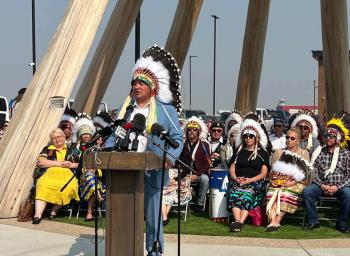Image Caption
Summary
Local Journalism Initiative Reporter
Windspeaker.com
The Federation of Sovereign Indigenous Nations (FSIN) has put the governments of Saskatchewan and Canada on notice. In the next two weeks the organization plans to file a statement of claim in court to challenge the governments’ control over natural resources.
“A battle is brewing,” said FSIN Chief Bobby Cameron at a press conference on Aug. 29, and legal action has been a long time in coming.
“Since treaties were signed, they have been impacted. They have been infringed on. They have been breached,” he said.
“What we’re saying is our treaties are of international law. They trump federal and provincial laws.”
At issue are both the federal Natural Resources Transfer Act (NRTA) of 1930 and the recently passed Saskatchewan First Act in 2022. Both pieces of legislation give the province control over natural resources.
FSIN Vice Chief Heather Bear said chiefs had given the FSIN a mandate to make the legal challenge.
Bear said the Doctrine of Discovery was the “colonialist and racist illegal document” used by Canada to implement the NRTA, which handed over control of natural resources to Saskatchewan as well as Alberta, Manitoba and British Columbia.
The Sask. First Act, which received third and final reading in March, is a continuation of the Doctrine of Discovery, she said.
The Sask. First Act asserts the province's exclusive jurisdiction in the areas of exploration of non-renewable natural resources, the development, conservation and management of renewable and non-renewable resources, and the operation of sites and facilities to generate electricity.
First Nations weren’t consulted when the NRTA was developed and First Nations were not consulted when the Sask. First Act was created either, said Bear.
“When the province says that they have exclusive jurisdiction over the natural resources within our treaty territories and our lands, this is simply false. The treaties…were meant to allow for settlement of the prairies. Not to surrender the lands and resources,” she said.
“Our ancestors have continually said that we shared the land to the depth of a plough. There were never any discussions during the treaty negotiations about what was underneath the surface, nor was there ever discussion on the water.”
Bear also contended that a revised draft consultation policy framework recently released by the Sask Party government decreases the amount of Crown land that will require consultation.
Cameron and Bear were joined by representatives of the Meadow Lake Tribal Council and Prince Albert Grand Council, as well as chiefs from Saskatchewan, Alberta and Manitoba.
“We are uniting to claim what has never been extinguished,” said Chief Erica Beaudoin of Cowessess First Nation.
Chiefs are pushing for resource revenue sharing.
Cameron said a 25 per cent—75 per cent split is being proposed, with the lesser amount going to the First Nations.
Dene vice chief Lawrence McIntrye with the Meadow Lake Tribal Council said First Nations should not have to negotiate benefits with every developer.
First Nations are tired of getting only the crumbs, said Chief Tyson Bear of Flying Dust First Nation.
He said First Nations need revenue to support their members both on and off reserve.
“Sometimes it’s okay to ask. Other times we just have to fight. We have to fight for what’s rightfully ours and what belongs to our nations and all our Elders and our people,” said Chief Tyson Bear.
Cameron warned investors to stay away from the province, because Saskatchewan will not be able to deliver on the rare earth metals that the government is promising.
He added that legal experts were working on a one-page document to present to Liberal Prime Minister Justin Trudeau and Saskatchewan Premier Scott Moe saying First Nations will “receive their fair share” so they can meet their needs, including investing in housing and tribal policing, and addressing alcohol and drug violence on reserve.
Onion Lake Cree Nation, which straddles the Saskatchewan-Alberta border, launched legal action against the Saskatchewan government in April challenging the Sask. First Act.
In December 2022, Onion Lake also began court action against Alberta’s Sovereignty within a United Canada Act, arguing that it also infringes upon the rights guaranteed to Onion Lake Cree Nation through treaty.
The Assembly of First Nations Special Chiefs Assembly in December 2022 passed an emergency resolution condemning both the Sask. First Act and the Alberta Sovereignty Act, calling for the two provincial governments to “immediately engage in meaningful and respectful dialogue on resource revenue sharing, so that First Nations benefit from the resource wealth in their respective traditional territories.”
The Métis Nation-Saskatchewan has also threatened legal action against the Sask. First Act.
Local Journalism Initiative Reporters are supported by a financial contribution made by the Government of Canada.

